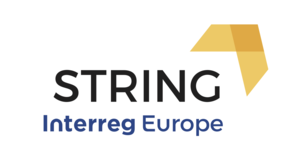The partnership of STRING visited Aria Alsace (Colmar)
The pan-European project STRING improves the performance of regional development instruments and programmes in building strong regional agrifood parks and clusters. The knowledge brokers in the partnership across Europe visited fieldlabs, testbeds and experimental gardens in the French region Aria Alsace, December 2019. The aim was to exchange new R&D-insights, promotional activities and novel food concepts across Europe.
Ultimate Knowledge Guide
Pan-European projects are all about knowledge exchange to create a learning curve on one specific topic or another. When it comes to building strong regional agrifood clusters and park project STRING is the ultimate knowledge exhange project in Europe. That’s why project partner Central Denmark Region (CDR) came up with our very own methodology and an Ultimate knowledge guide. Based on these knowledge exchange guidelines and playcards project partners were able to analyse good practices in other regions and really learn from them. All the STRING-regions together came up with a longlist of wise lessons based on one year of knowledge exchange activities and methodology:
- “Host Planning Tools” was a huge success but “summaries” were a bit too complex for regular usage.
- The lack of time as the main obstacle.
- These activities were organized and argued that methodology was very helpful for keeping things well structured.
- KE methodology was helpful to understand properly the common features as well as the specificities of site visits and partner exchange.
- Sometime technical issues were an obstacle (traffic, laptops not working).
- Short period to ponder upon what was done/achieved; Planned activities of these events should be reduced to improve the quality of the experience; Most of the learning happened “between the lines”.
- Methodology was useful for organizing hosting activities.
- CARDs were useful and their role/purpose/usage should have been fully utilized
- More budget is needed for these activities in order to involve more stakeholders.
- Stakeholder engagement was the key benefit of a site visit for some regions
- Personal interactions – coming and seeing everything in person is essential. This way partners observed local SHs, their passion and pride about their work which is sometimes essential factor for the GP success.
Next phase: Action Planning
Project Partner Debrecen Municipality is the key partner organizing to create regional action plans across Europe. They’ve been creating a flowchart that sums up the structure of a strong (regional) action plan that targets to influence regional policy instruments. This is the main structure every STRING regional action plan will build upon:
- “Reaching the objectives” where partners should list their objective(s) as well as the plan to achieve this goal. Stakeholders are crucial for this section and they should all work closely together and ensure their activity is well harmonized, and take into the account those stakeholders that might oppose your proposed actions and try to think of ways to address this issue;
- Partners have a repository of tools they can use to achieve these goals, such as good practices, “Engines for change”, regional summaries, etc.
- “Actions” should be precisely defined and well elaborated and all implications of the proposed actions should be explained in details. Timeline and financial aspects of the Action proposed have to be addressed.
- Partners are encouraged to think about long-term goals but to set up the key “milestones” that could be achieved within Phase 2. All partners should also list a “responsible person” and think of potential risks that might occur during the implementation.

